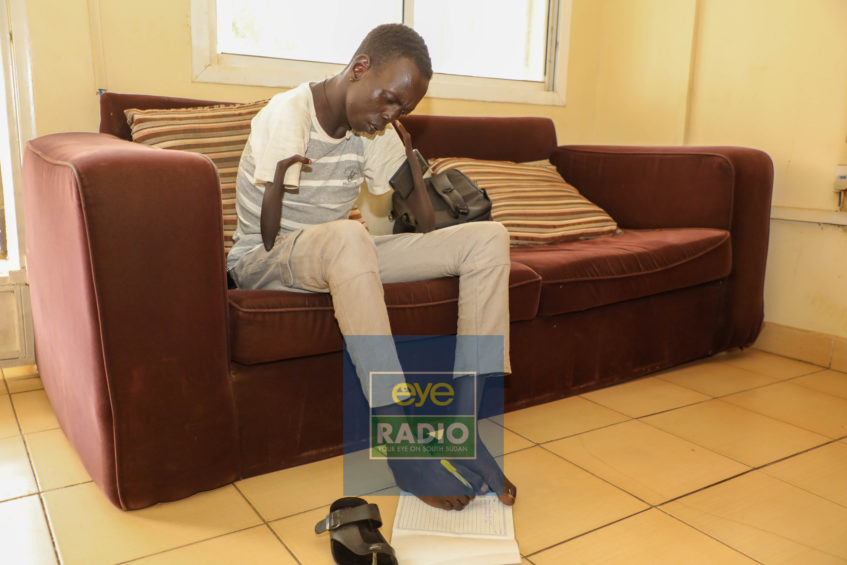You are here: Home | Education | Humanitarian | National News | News | States | Armless student appeals for help to pursue career

Emmanuel Gai using his feet to write his name at Eye Radio during an interview on Tuesday 18th Jan. 2022. Photo: Lou Nelson/Eye Radio
Have you ever pictured a life devoid of arms? For the able-bodied, this could mean distress, strain, and probably a life without meaning.
But this is not the situation for 20-year-old Emmanuel Gai who is turning his disability into a family joy.
Gai who uses his feet to write is a first-year student at the University of Juba pursuing Bachelors of Economics and Banking.
Gai says education was the only thing he can opt for, given his condition that couldn’t allow him to do other physical activities such as farming and cattle keeping.
Despite the desire to have his educational calling completed as he dreams, Gai fears his goal could be shortened due to a lack of financial assistance.
“I am writing using my feet because of my condition, I don’t blame anybody for it, I don’t even blame God, and he knows why I am like this.”
“I am a great deal in mathematics and English, I want to become an economist and specialized in Banking” the 20-year-old motivates himself.
His parents, who all live in Rumbek Town of Lakes State are both substance farmers.
Gai now worries, his parent’s status may not help him achieve his goal due to financial constraints.
“I am unable to pay my tuition and I lack a computer and a smartphone for doing my research and course work. My mother is a housewife and my father is a farmer and they can’t raise my tuition.” Gai told Eye Radio.
Gai lives in New Site, a suburb located nearly 5km from the university north of Capital Juba.
He says his mobility to the campus for lectures has been one setback to his dreams.
Most of the time, Gai says, he endures on the gentleness of friends and some family members for support.
“Sometimes I skip lectures due to lack of transport from New site to the University”, he explains his circumstance.
He is the last born in the family of five and the only one born with such a condition.
Despite being born with no limbs, Gai has adapted to carry out other dizzying array of activities with his feet, including playing football and writing.
Gai is now requesting sympathizers to emanate to his aid and help in facilitating his dream journey.
“I am appealing to the government and well-wishers to help me with tuition, transport, a laptop, and a smartphone for doing my course work and research.”
Gai scored 51% in the South Sudan Certificate of Secondary Examination in the 2019/2020 academic year.
This enabled him to enroll at the country’s main university a year later.
Born in Rumbek, Gai joined Malual Bab Primary School in Lake State where he scored a passing grade of 75% in the South Sudan Certificate of Primary Education after where he would later become a high school student at Rumbek National Secondary School.
According to the Union of Physically Disabled Persons in South Sudan, most people with disabilities are unemployed and there are almost no social safety nets and food security schemes for persons with disabilities in the country.
There is no specific legislation relating to the rights of persons with disabilities in the country and South Sudan has not ratified the UN Convention on the Rights of Persons with Disabilities.
Statistics or comprehensive information on the number and situation of people with disabilities in South Sudan is lacking.
However, most estimates suggest that it is likely to be at least as high as the global estimate of 15% and a few household surveys have found similar percentages of people with disabilities within households.
Disability is often stigmatized in South Sudan and as a result, children and adults with disabilities are hidden and isolated.
But Gai said he has not encountered stigmatization among his classmate or family.
Gai urged those with special needs to avoid drugs, alcohol but rather pursue their studies and not give up.
“I am appealing to people living with disability not to give up and stop drugs and drunkenness, disability is not inability.” He concluded.
The Child Act of 2008 states that “Every child has the right to education regardless of the type of severity of the disability he or she may have.”
The 2030 Agenda for Sustainable Development identifies education as a tool to empower people with the knowledge, skills, and values to live in dignity, build their lives and contribute to the development of their societies.
Support Eye Radio, the first independent radio broadcaster of news, information & entertainment in South Sudan.
Make a monthly or a one off contribution.
Copyright 2024. All rights reserved. Eye Radio is a product of Eye Media Limited.